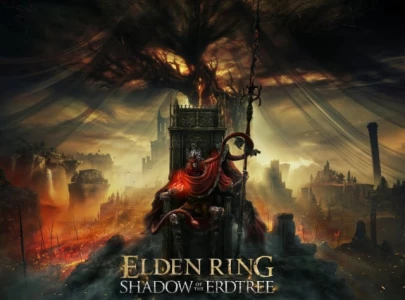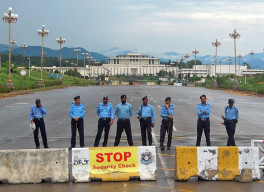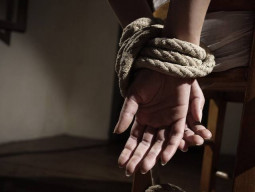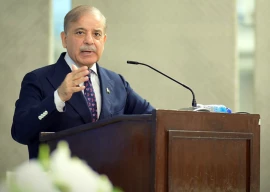Today he works as part of the Houston Police Department’s Chief Command, and a liaison to the Pakistani and Muslim community. Siddiqi is an imposing figure - underneath his friendly demeanour one senses a core of steel.
He joined the force in 1996, after moving from Karachi where he worked as an officer. But his rise to prominence came after 9/11, when he worked with the Pakistanis and Muslims. As we chat, a photograph of him meeting President Obama looks over us, framed prominently in the room.
“The people here had no clue about Pakistanis. After 9/11, the Pakistani community and the Muslim community had become isolated,” says Siddiqi. “But we worked here, and told local Americans about who we were. There are 100,000 Pakistanis in Houston, and nearly a quarter of a million Muslims. We have a very good, strong position. We have doctors, engineers, businessmen. In fact, Pakistanis own 80% to 90% of the gas stations in Houston.”
But recently, there has been intensive reporting by the Associated Press about the NYPD spying on the Muslim community in the aftermath of 9/11. Has the Houston Police Department been affected by such stories? “I don’t know about the NYPD, but here, the community trusts us a lot. Even before 9/11, the community’s bonding with the police was very strong, and this made a lot of difference,” says Siddiqi. He cites that as part of the reason why there weren’t as many hate crimes against Muslims in the aftermath of the 9/11 attacks as there were in other parts of the country, and says that the Muslims have never had questions about spying. He adds that there has been research done here that shows that the Houston Police Department’s ties with the Muslim community are the strongest as compared to other police departments.
Houston has a sizeable Pakistani population, and along with it come the same kind of problems and crimes that others face. It used to just be white-collar crime, but as trust in the police went up, more and more people felt comfortable reporting a crime whether murder, shoplifting, family violence.
Siddiqi’s family too has been the victim of crime. In 2010, his brother-in-law was shot dead at his convenience store.
Siddiqi was the only Pakistani when he was part of the Houston Police Department. Now, seeing him as a role model, more Muslims and Pakistanis have joined the force.
“Our parents should understand that they shouldn’t just make their children choose [medicine] or engineer[ing] as a career. Because I always say that kids should go into journalism, or law enforcement – and now we see, slowly, that some are entering the law-enforcement area. The kids do want to come in [but] the parents don’t want [it].”
Even when he was joining the force in Houston his mother was worried and indeed, her concerns stay. But he firmly believes that if a community wants to be included in mainstream society it has to join every profession.
Officer Siddiqi also trains Pakistani police officers who come to Houston, and visits his hometown regularly. “The biggest change I noticed that the police in Pakistan is not independent. Perhaps
they’re a weapon of the politicians,” he says. Houston’s police is independent; they’re from the community and the community is the one supervising them.
“Our [Pakistani] police officers aren’t bad, they’re the best – but the system is broken,” he remarks. He understands that when your salary is low, you are tempted to accept bribes. A constable in Karachi, for example, earns Rs18,000 or about $180 a month. The difference is that in Houston, police can work extra jobs after their shift is over. It also helps that the Houston Police Department arrests its own men if they break the law.
As a solution, he suggests that Pakistani Americans should adopt police stations back home, and help them improve their facilities. “Our police morale is down. Our police officers, who are martyred, I don’t think their families are treated well.” Siddiqi wants to give back to the police in Pakistan would like to offer a scholarship to the children of any martyred police officer’s son or daughter.
He was inspired by Peshawar police officer, Commandant FC Sifwat Gayyur Khan, who was killed by a suicide bomber on August 4, 2010. “I was very impressed when I read his story. I want to name this scholarship after him.”
Published in The Express Tribune, August 11th, 2012.
COMMENTS (19)
Comments are moderated and generally will be posted if they are on-topic and not abusive.
For more information, please see our Comments FAQ










1731929357-0/Express-Tribune-(6)1731929357-0-270x192.webp)






@Zalim Singh: One wonders why you're not so bu..hurt over death to America chants, which happen to be a routine Friday feature in Iran (your proposed $24bn pa trade partner). Guess I gave the answer away ! Its gotta be the money.
@Someone: Large??? its the wrong word to describe indian diaspora... the word is overpopulated and humongous
God bless you. Just do your job honestly and don't take any bribes. That is all.
Muzaffar Siddiqi is and has been the backbone to our Pakistani and Indian community.....its a relief and a sense of security to know that we can always relate and communicate at ease with someone to explain to us various issues which are sometimes misunderstood by many of us about the legal system of the country we all lve in and benefit from. We have deep respect for the respect and values that are rendered by Muzaffar Siddiqi. Thank you...stay blessed
@Someone But we don't call for death to America.We don't plant bombs in busy New york streets. Do you see the difference?
@Zalim Singh: I am sure the number of Indians is also quite large.
Proud of you sir...
Pakistanis suddenly become efficient when they live and work in West. They key is Merit which prevails in those societies so we give our best. Not here ,where Sifarash prevails.
$180 a month? That... is gross for a job fitting a police officer job description. Here, that's less than what the minimum wage in the US would come out to, after taxes, in a week. The people who make that wage are rather vocal about it not being enough, as well. I know I'm comparing two very different countries when I make that judgement but, prices of things usually only go up no matter where you live and I can't imagine prices in Pakistan being so different to the extent of making that wage reasonable. Now I get why they're lazy and corrupt. I don't agree with or respect such a lack of integrity in someone people are supposed to be able to rely on and trust... But, I get it.
Keep It Up Man....
Nice to know about him.
1 Lakh Pakistanis in Just one US city? And you guys sing death to America. How many of these would settle back home?
Impressive !
Great to see you working and giving the other side of the picture of Pakistanis
Pakistanis are great people if they are not amongst a cluster of Pakistani
nice.. glad to see that Safwat ghayur has inspired so many ppl..
**“The biggest change I noticed that the police in Pakistan is not independent. Perhaps they’re a weapon of the politicians,” he says.
This is the same reason I'm voting for Imran Khan, because he wants to revamp our police & the entire justice system. Providing free justice for every citizen of Pakistan, is also one of the basics of our faith Islam.
If this cop can leave Karachi & hold one of the best jobs, why can't we improve our own inside Pakistan??? It is because we don't have good leadership.
People like Nawaz Sharif, Zardari, Bhuttos, Jatoi's, Chaudry's, Maulana's have all been tested & tried several times before. Time to hang them, and get back our looted wealth.
Zindabaad.
Bravo Muzzafar. May you continue to do well for yourself and for the people who you serve.